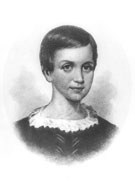Emily Dickinson (1830-1886) is one of America’s greatest poets. Largely unpublished during her lifetime, the reclusive poet has now become one of the most widely read female poets.
View: Emily Dickinson Poetry
View: Tribute to Emily Dickinson
Emily Dickinson Biography
 Emily Dickinson was born in Amherst, Massachusetts, to a family well known for educational and political activity. Her father was an orthodox Calvinist who was a lawyer and served for a time in Congress. Emily studied at Amherst Academy (1834-47) and a couple of years after finishing her education she began writing poetry. At the age of 23 Emily withdrew more and more into a secluded life, rarely venturing out into social circles. Emily spent most of her time in her room often composing poetry. Although Emily led a reclusive outer life, she did correspond with writers such as John Keats, John Ruskin, and Sir Thomas Browne. However although her outer life was one of great simplicity the poetry of Emily Dickinson offers a wealth of spontaneity and creativity.
Emily Dickinson was born in Amherst, Massachusetts, to a family well known for educational and political activity. Her father was an orthodox Calvinist who was a lawyer and served for a time in Congress. Emily studied at Amherst Academy (1834-47) and a couple of years after finishing her education she began writing poetry. At the age of 23 Emily withdrew more and more into a secluded life, rarely venturing out into social circles. Emily spent most of her time in her room often composing poetry. Although Emily led a reclusive outer life, she did correspond with writers such as John Keats, John Ruskin, and Sir Thomas Browne. However although her outer life was one of great simplicity the poetry of Emily Dickinson offers a wealth of spontaneity and creativity.
‘If I can stop one heart from breaking,
I shall not live in vain;. ‘
~
‘Hope is the thing with feathers
That perches in the soul,
And sings the tune without the words,
And never stops at all;’
Unfortunately most of her poems were not published until after her death, first by her sister and later by Martha Dickinson Bianchi (her niece) Many modern commentators argue her poems were heavily edited and some things have been lost in translation. Nevertheless her poems proved to be successful and some lines have become the best known quotes from poetry.
Also Emily is regarded as an innovative poet, who has had an impact on modern poets. For example many of Emily’s later poems didn’t stick to conventional poetic forms. Emily made frequent use of dashes, off rhymes and broken metres.
Religious Influences on the poetry of Emily Dickinson
Emily wrote many of her poem during a periood of religious revival that swept Western Massachusetts during the decades of 1840-50. However an important element of Emily Dickinson’s poetry is her ability to transcend the prevailing religious orthodoxy of the present time. Although her poetry makes little reference to “formal religion” she was absorbed by spiritual concepts especially immortaility and the overcoming of death.
‘Because I could not stop for Death –
He kindly stopped for me –
The Carriage held but just Ourselves –
And Immortality…’
Emily did not write any articles or poetry or specifically on religion. However we can see from her poetry she had a great love of nature and also an inner love of God. In her beautiful poem “I taste a Liquor never brewed.” Emily reveals her love of nature, expressing her inner delight she feels through a connection to nature. Also it is interesting that although Emily was a well know introvert who spent much time alone, her poems also often express a spontaneous feeling of joy. A joy that occurs despite her other feelings of loneliness.
“Inebriate of air am I,
And debauchee of dew,
Reeling, through endless summer days,
From inns of molten blue.”
The publication of Thomas H. Johnson’s 1955 edition of Emily Dickinson’s poems gave readers a complete and accurate text.
By: Richard
Emily Dickinson Resources
- Emily Dickinson Poetry at Poetseers
- Books on Emily Dickinson
- Emily Dickinson.org
- Emily Dickinson Biography

Be the first to leave a comment. Don’t be shy.
You must be logged in to post a comment.